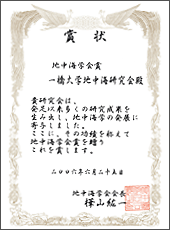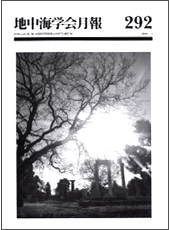History
Winner of the 2006 Mediterranean Study Award
Award acceptance speech
Hiroshi Kato of the Mediterranean Studies Group at Hitotsubashi University
The group can be said to have the following two characteristics. The first is the group's unrestrained legwork that enables it to engage closely with the Mediterranean world ? something achieved through its imagination, expansion of ideas and open exchange of opinions.
After the campus fell into disarray following a dispute at the university, Byzantine scholar Prof. Kinichi Watanabe and geographer Prof. Keiichi Takeuchi ? two scholars influenced by the principle of the dialectic between space and time put forward by the Annales School, an elite French history school ? established the group after deciding to do "something fun." The pair did not band about difficult words such as "interdisciplinary" or "trans-regional," instead, through relaxed debate and dialog, they managed to overcome the divisions in academia of specialty and region.
The second characteristic of the group is basically the same as the first. The difference is that the group consciously tries to view the Mediterranean region as more than a historical reality, rather as a regional concept or regional structure that can be analyzed as one entity. It took the rare step of asking the direct question of what the Mediterranean world is. Importantly, however, the creation of a regional entity called the Mediterranean world brought with it a bunch of new questions. All the researchers in the group had great pride in their own work, but whether they were historians or geographers, they also seemed to posses the common feeling that the Japanese academic system was lacking in some way and would duly criticize it. The target of their criticism was state-level research.
The group entered its 34th year in 2006. Since coming into existence, the group has seen changes in its personnel and atmosphere. The biggest change has been in its research environment. Until the 1980s, meetings would be held without fail on a monthly basis, with almost all team members taking part. However, its fields of study have become increasingly specialized and the group has turned into a center of excellence for research projects. This has led to researchers, especially younger ones, joining a number of research meetings related to their own fields of specialty, making it difficult for all members to attend group meetings. Some people in these numerous research meetings call for interdisciplinary or trans-regional research, but the researchers give the impression that they are unwilling to engage in such research, preferring to concentrate on their specialist fields. All this has meant that the group has moved away from its intended role, and I sometimes feel it is time to draw the curtain on its activities.
But when I think this, I always recall the words of Koichiro Shimizu, an Italian history scholar who died at a young age in 1988. Shimizu said: "You can quit anytime. I research northern sections of the Mediterranean Sea, and [the research meetings] provide me with the rare opportunity to unabashedly ask completely elementary questions about southern sections of the Mediterranean Sea. We should keep [the group] going." In fact, when I think of the current state of learning, I feel it's necessary, especially now, in a different sense to in the past, to have a mature research group for networks like ours.
(An extract from acceptance speech for the Mediterranean Study Award in 2006)

